Has The Media Compromised Willingly?
 Has The Media Compromised Willingly?
Has The Media Compromised Willingly?Media management is the practice of directing and controlling media-related businesses and business functions
Media management is the practice of directing and controlling media-related businesses and business functions. This includes management roles in the media industry and plays a crucial role in the functioning of any media organisation.
But of late the term media management has undergone metamorphic change and it has taken the form of managing media mostly by the governments whether it be at central level or State level.
India is becoming a breeding ground for a biased, stifled media. The big question is why is it being hijacked by vested interests. Why is there a hostile environment of abuse and violence against journalists.
Within a truly democratic and secular framework, the media is conceptualised as the 'fourth estate', which must be allowed to function independent of government to maintain a system of checks and balances on the power of the State, and to objectively observe, report, analyse and critique its actions to communicate to the people at large.
Till recently media persons used to admit privately that they're under extreme pressure from government to serve its agenda. But now they are openly talking about it.
The irony is that they are not able to collectively fight back for various reasons and most importantly because they are no more united and have lost the sprit to fight back.
People at the top prefer to be in the good books of the people in power and the industrialists under the guise of good public relations strategy.
PR is of course necessary but what is happening is that instead of utilising good PR in positive sense which could help the government in becoming more transparent in governance and make it work better, certain sections of media have started donning different roles giving an opportunity to the government to gain control over it.
The journalist unions which once used to be very powerful have become pocket boroughs of the government.
With the unions losing their voice, with the media becoming more and more dependent on the government advertisements to generate revenue, things have started from going from bad to worse. Stifling of media has begun from this point.
Attacks by government officials on the institution of the press calling it as "dishonest" works to further destroy public trust. Trying to bully the press with threats or insults only works to weaken our democracy.
But that is exactly what is happening across the country. The national parties and the regional parties have become highly intolerant of criticism. So much so that they have come with new laws and are giving extreme powers to bureaucracy to initiate legal action against the media.
There was a time when if even a small comment insulting any reporter was made by any minister or any politician would invite loud protest and entire media used to stage a walk out and boycott future media briefings till an apology was offered.
But now that unity is not there. The fault lies with the media as well since it has allowed the governments to gain control over them.
The Government as part of its strategy to gain control over media has started luring the top leaders of various unions and has started offering them plum posts though most of time they are turning out to be just ornamental posts.
On the other hand, thanks to the development of technology, some have launched their own YouTube channels and have become self-proclaimed analysts with the objective of getting maximum hits so that it can become a revenue model for them.
This has resulted in the media being unable to tell countless stories of public interest because of weak whistleblower protections, defamation laws, excessive suppression orders and a growing practice by government departments to reject freedom-of-information requests on the basis they are not in the public interest. Many may not agree but the hard fact is that media has allowed itself to be tamed.







